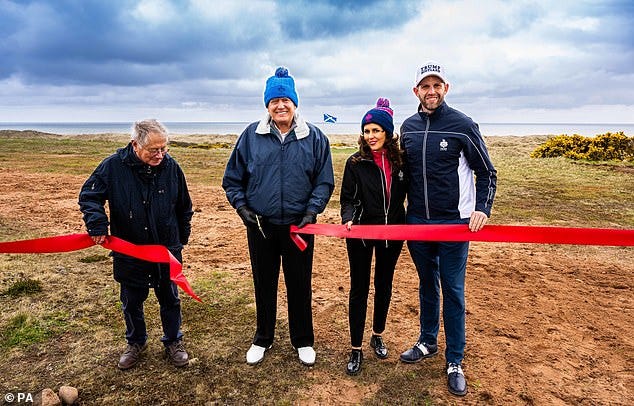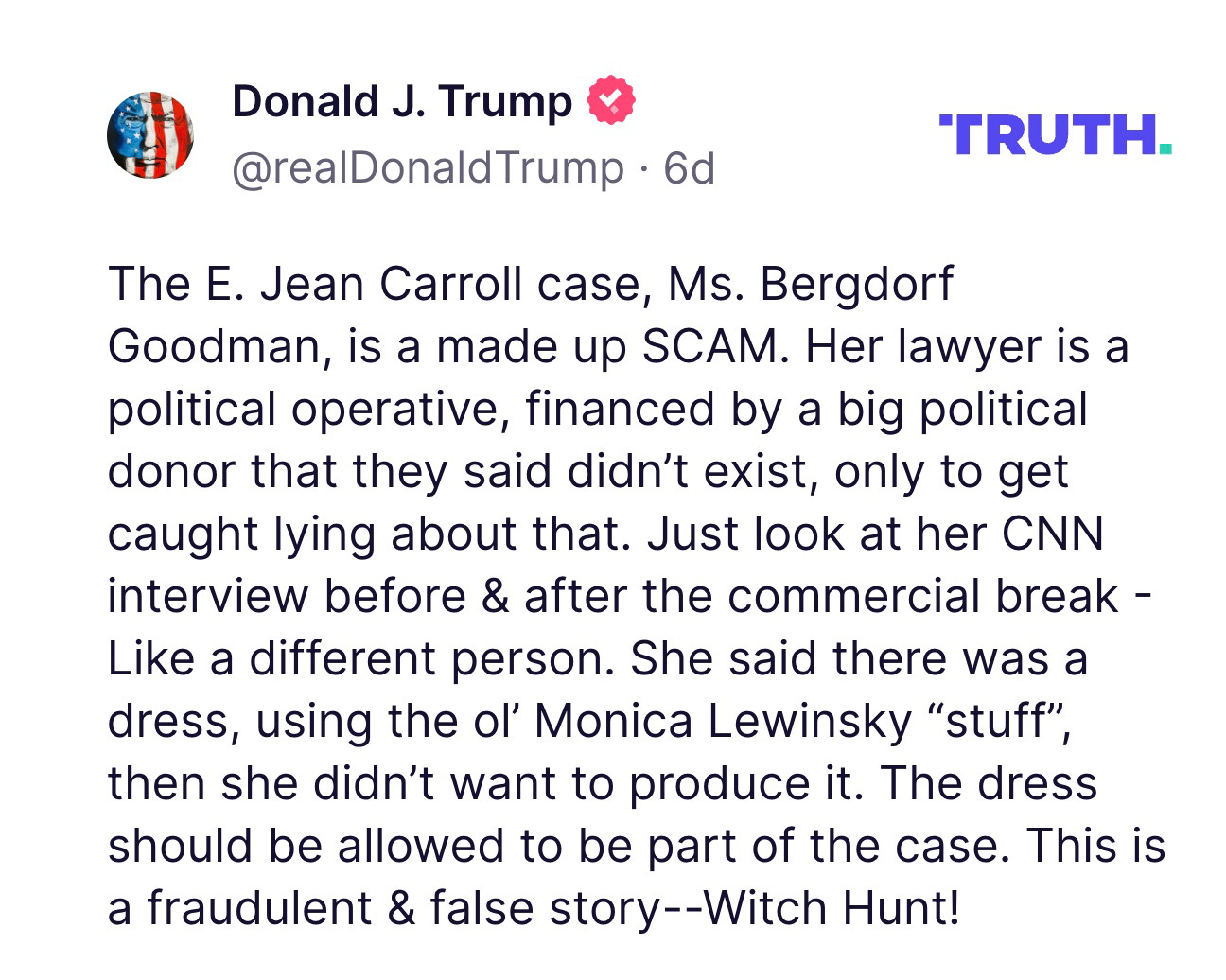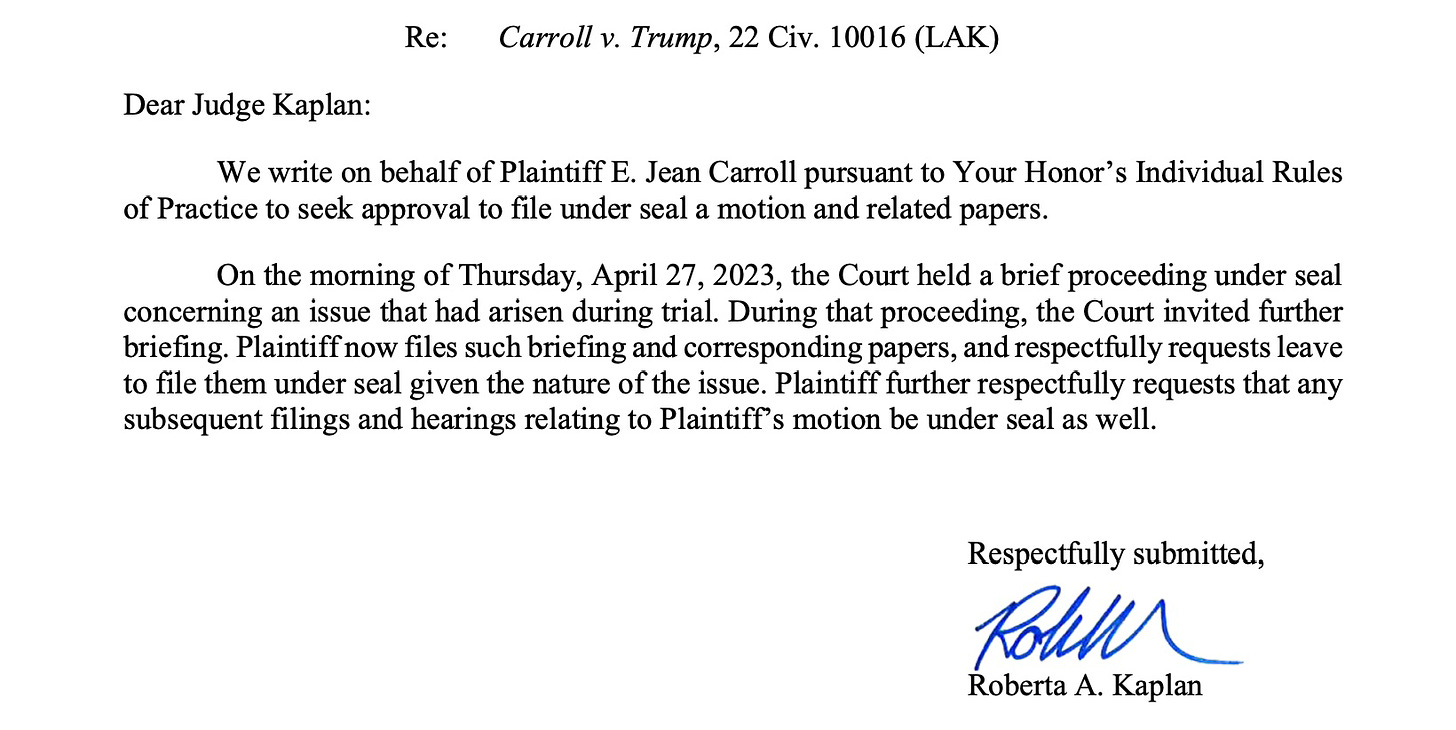The E. Jean Carroll trial continues. Carroll’s turn on the witness stand is finished. “Outcry witnesses,” the two close friends who she shared her experience with contemporaneously, as well as two women who were also assaulted by Trump, are beginning to testify. The trial is expected to finish up this week. Trump’s lawyers advised the court today that he will not testify. He’s in Scotland, opening another golf course.
Trump, predictably, is showing utter contempt for the court proceedings against him. He does not take the allegation that he raped a woman seriously. It’s the ultimate effort at an insult from a man who treats women as objects. But instead of making a splash, Trump’s absence has become irrelevant at his own trial.
The jury will hear his confession about how he treats women from his own lips in the courtroom when Carroll’s lawyers play the Access Hollywood tape later this week. As vile as the language Trump uses is, it’s important to review the transcript. For one thing, it reminds us of precisely what the jury will hear. And also, while we’re at it, it reminds us of what Republicans were willing to ignore when they voted for Trump in 2016 (and again in 2020, and still now, with a recent CBS poll showing 58% of Republicans say they will vote for Trump in 2024 and another 18% are considering it).
Here’s the relevant part of the transcript:
Unknown: “She used to be great, she’s still very beautiful.”
Trump: “I moved on her, actually. You know she was down on Palm Beach. I moved on her and I failed. I’ll admit it. I did try and fuck her, she was married.”
Unknown: “That’s huge news there.”
Trump: “No, no, Nancy. No, this was [inaudible] and I moved on her very heavily. In fact, I took her out furniture shopping. She wanted to get some furniture. I said I’ll show you where they have some nice furniture. I moved on her like a bitch. I couldn’t get there, and she was married. Then all of a sudden I see her, she’s now got the big phony tits and everything. She’s totally changed her look."
[Trump is speaking with Billy Bush, a TV host and nephew of former President George H.W. Bush, from this point on.]
Bush: “Your girl’s hot as shit. In the purple.”
Multiple voices: “Whoa. Yes. Whoa.”
Bush: “Yes. The Donald has scored. Whoa, my man.”
Trump: “Look at you. You are a pussy.”
Bush: “You gotta get the thumbs-up.”
Trump: “Maybe it’s a different one.”
Bush: “It better not be the publicist. No, it’s, it’s her.”
Trump: “Yeah, that’s her with the gold. I better use some Tic Tacs just in case I start kissing her. You know, I’m automatically attracted to beautiful... I just start kissing them. It’s like a magnet. Just kiss. I don’t even wait. And when you’re a star they let you do it. You can do anything.”
Bush: “Whatever you want.”
Trump: “Grab them by the pussy. You can do anything.”
Bush: “Yeah, those legs. All I can see is the legs.”
Trump: “It looks good.”
Bush: “Come on, shorty.”
Trump: “Oh, nice legs, huh.”
Bush: “Get out of the way, honey. Oh, that’s good legs. Go ahead.”
Trump: “It’s always good if you don’t fall out of the bus. Like Ford, Gerald Ford, remember?”
[As Trump attempts to leave the vehicle, he struggles with the door.]
Bush: “Down below, pull the handle.”
[Trump exits the bus and greets actress Arianne Zucker, best known for playing Nicole Walker on the NBC daytime soap opera Days of Our Lives.]
Trump: “Hello, how are you? Hi.”
Zucker: “Hi, Mr. Trump. How are you?”
Trump: “Nice seeing you. Terrific. Terrific. You know Billy Bush?”
Bush: “Hello, nice to see you. How are you doing, Arianne?”
Zucker: “I’m doing very well, thank you. [Addressing Trump] Are you ready to be a soap star?”
Trump: “We’re ready. Let’s go. Make me a soap star.”
Bush: “How about a little hug for the Donald, he’s just off the bus?”
Zucker: “Would you like a little hug, darling?”
Trump: “Absolutely. Melania said this was okay.”
It’s going to hit the jury in the gut when they hear it. “When you’re a star they let you do it. You can do anything.” It’s what he did to Carroll, it’s what he did to the two other women whose stories the jury will hear. And Trump won’t take the witness stand to tell his side. That’s probably because there’s really not a side for him to tell. Only the hope that one or more jurors are firmly entrenched in his camp.
We haven’t heard much about the jury in this case, and that’s because the judge took the very unusual step, even in a criminal case but especially in a civil one, of keeping the jurors’ identities anonymous. Anonymous juries are used in situations where jury service might put jurors at risk of being harassed, annoyed, or even approached by someone seeking to influence them or harm them. Use of an anonymous jury here suggests the judge had concerns about jurors’ safety and wanted to protect them.
Trump put some flesh on the bones of those concerns with social media posts early in the trial.
Recent history has demonstrated, on more than one occasion, that Trump’s supporters follow where they perceive him to be leading them on social media. Judge Lewis Kaplan was more specific than that when he announced the jury would be anonymous. He pointed to Trump’s record of attacking “courts, judges, various law enforcement officials and other public officials, and even individual jurors in other matters.”
Trump’s team will be scrutinizing all of the judge’s decisions during the trial to try to find errors to argue on appeal if he loses. The anonymous jury decision is unlikely to be fertile ground. The judge supported his decision. And there has been a trend to use this process more frequently in recent years. Rural Cochise County in Arizona has adopted a policy of using juror numbers instead of names to protect identities. A local journalist brought a legal challenge to the practice after two criminal cases were conducted with anonymous juries on First Amendment grounds. He lost in the Arizona Supreme Court, and the U.S. Supreme Court recently declined to hear the case. That seems to signal the continuation of a permissive approach to the practice.
Finally, there is a sealed motion in the case, filed by Carroll’s attorneys last week, that we know virtually nothing about. We have only a letter from Carroll’s lawyer Roberta Kaplan, which documents the existence of the sealed matter but reveals no details.
Often when there are sealed proceedings like this during a trial, in my experience, they involve some question about the jury. Perhaps a juror had an inadvertent conversation with a witness in the hallway—a matter that might seem insignificant, but the type of thing good lawyers document with the court. Or it could be something more serious, a question of contact with outside information (jurors are admonished to rely only on what they hear in court) or fitness. For now, we simply don’t know what this is about. But it could come into play as the trial progresses.
The jury in this case will have a powerful opportunity to tell Trump he cannot, in fact, grab women by the p----. It is in the context of a civil suit, and Trump will certainly appeal any verdict against him. But it will be a start if they do it.
Also of note in legal news:
The FBI has arrested and charged Jared Wise in connection with January 6. The FBI affidavit says Wise worked as an FBI special agent and supervisory special agent from 2004 until 2017. Wise moved to Oregon last year. He called Capitol police officers Nazis as he entered the building. “I’m former—I’m former law enforcement. You’re disgusting. You are the Nazi. You are the Gestapo. You can’t see it ... Shame on you! Shame on you! Shame on you!” he told officers. “Yeah, f--- them! Yeah, kill ’em! Kill ’em! Kill ’em! Kill ’em!” Wise is listed as a board member for an Oregon Vietnam Veterans Organization that operates a working ranch that “restores purpose and spirit to veterans of all ages.” His bio says he, “is a former Special Agent with the Federal Bureau of Investigation where he worked counterterrorism investigations in the Middle East, Africa, and Eastern Europe. Prior to joining the FBI, he worked in asset management, commercial banking and investment banking. He is a graduate of Pepperdine University and the University of Texas at Austin.” No word yet from FBI Director Chris Wray. It is, as we say far too frequently, shocking but not surprising to see an FBI agent charged in connection with the insurrection.
Congress frequently delegates authority to federal agencies to regulate particular aspects of society. Sometimes the delegation is very specific, but other times it is general or broad. SCOTUS has agreed to hear Loper Bright Enterprises v. Raimondo, which may signal its intent to overturn the Chevron doctrine, which requires deference to administrative agency interpretations. Chevron is pretty inside baseball even for lawyers; it’s the stuff of law review exams. But this case will have important implications, and we’ll be focusing on it later this week. We’ve seen the demise of Chevron coming in the Court’s use of the “major questions” doctrine in a number of decisions where it has said that if an agency decides an issue of major national significance, its action must be supported by “clear” congressional authorization or they don’t have the power to act. The Court’s new conservative majority used the major questions doctrine to end the federal ban on evictions during the pandemic and to block the vaccine mandate for large employers. It has come up in FDA and EPA cases. If Chevron is reversed, it will be a sea change that will affect all of us, despite the dryness of the subject.
Late this evening, the manhunt ended for a Texas man who killed five of his neighbors with an AR-15 rifle in their home, including a 9-year-old boy and mothers shielding other children, who survived. The shooter is Francisco Oropesa, 38, who was arrested after a call to an FBI tip line that resulted in his arrest just 45 minutes later. The San Jacinto County Sheriff, Greg Capers, said Oropesa was hiding in a closet underneath some laundry when he was captured and called him a coward. He will be held on five murder charges. While Texas Governor Greg Abbott was quick to point to the “illegal” status of the victims, the important questions involve how a defendant, who himself was in the country without legal status, was able to obtain a firearm. And of course, the larger questions of when we will find our way back from the gun culture that keeps weapons of war on the streets and endangers new lives every week is still unanswered.
We’re in this together,
Joyce







I’m listening to Joyce and others on Nicole Wallace’s show discussing the E. Jean Carroll trial. My mind went immediately to Dr. Christine B. Ford and how she was treated by the Congress and terrorized by terrible people who decided to threaten her and her family because she dared share her awful experience with kavanaugh. Her world was shattered for a second time because of that man and because of how our society still chooses to treat women who speak out.
Thank you for this detailed essay about the ongoing E. Jean Carroll trial. I hope justice will be eventually served. She has endured much suffering for many years. I remember reading about his assault on her when he was running for president, and to this day still find it incredible that he STILL got elected despite the numerous other victims and accusers.